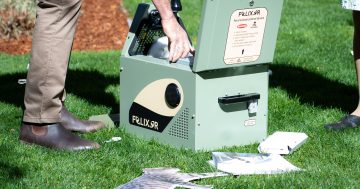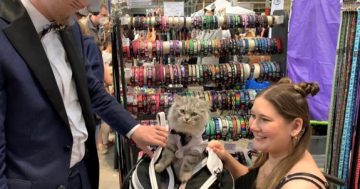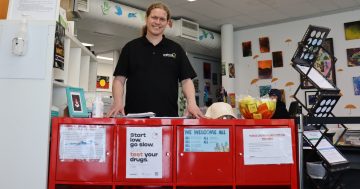
A colony of cats at Fyshwick being looked after by the Canberra Street Cat Alliance. Photo: Supplied.
A mega colony of 47 cats roam an industrial area of Fyshwick they call home. The street cats are in reasonably good health, have food and shelter and apparently help keep the rodent population in nearby buildings under control.
The Fyshwick colony is one of many roaming the streets of Canberra’s industrial estates, food outlets, drains and rubbish tips, but a group of volunteers who keep a close eye on their feline friends say there is a lot of misinformation about Canberra’s street cats.
“If people would look at the other side of how these cats live, then they could understand that these cats aren’t actually feral. They are homeless,” president of the Canberra Street Cat Alliance Vanessa Parton tells Region Media.
“They’re not feral and there’s a distinct difference between a feral cat and a community stray. Our colony carers feed these cats and can pick them up and do a basic health check. The cats are generally scared of people but our carers have the same relationship with them as a normal pet owner.”
There are about 30 active carers in the Canberra Street Cat Alliance, which is but one of many groups that dedicates itself to various aspects of caring for Canberra’s wildlife.
The street cats will be taken into foster care if they are sick or need ongoing treatment once a veterinarian has checked them. In the last financial year, 173 cats were adopted or re-homed, six deceased and 73 were provided with veterinary assistance before being returned to their home location, the alliance says. *
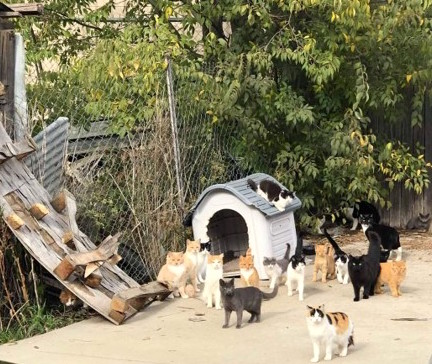
Part of the colony of street cats at Fyshwick. Photo: Supplied.
Vanessa said the issue of Canberra’s street cats also needs to be better understood and that a Draft ACT Cat Plan from April 2019 needs more work to address the growing population of street cats.
Canberra Street Cat Alliance volunteers had their busiest month in November picking up 69 new cats – more than two a day. They have assisted more than 320 cats this year at a cost of between $150-200 per cat to provide litter, flea or worm treatment, desexing, vaccinations and a premium food mix.
“There are about 15 colonies that we monitor around Canberra,” Vanessa says. “Some are only three to four cats, but the mega colony at Fyshwick has 47 at last count and the health of the colony there is fantastic.”
She says their program involves trapping, neutering or spaying (desexing), and returning the cat to its home, a program known as TNR.
While there is debate over returning the street cats against euthanising them or rehoming them, Vanessa says they return the cats because they are territorial, so removing them from their home only allows another colony of cats to take over.
“These community cats are like an extended family group. They’re feeding on rodents or from bins with food scraps.
“The misinformation is in relation to the amount of wildlife they kill because when they have a food source, they live happily with the birds and other wildlife,” Vanessa says.
However, research has shown that cats have already contributed to the extinction of more than 20 Australian mammals. In Canberra, it is estimated by the ACT Government that roaming cats kill 61,000 native birds, 2000 native animals, 30,000 native reptiles and 6000 native frogs each year.
CEO of RSPCA ACT Michelle Robertson said the issue with street cats is massive and it is unknown how many homeless cats there are in Canberra. Michelle said they work with the ACT Street Cat Alliance and other welfare groups, but more work needs to be done to understand to address the issue.
“We have 150 cats in foster care at the moment, but our preference is never to release a cat back into its environment. We will always try to socialise the cat where possible and find a suitable home,” Michelle said.
“We would prefer to talk about the importance of desexing your cat and providing a suitable area where it is contained.”
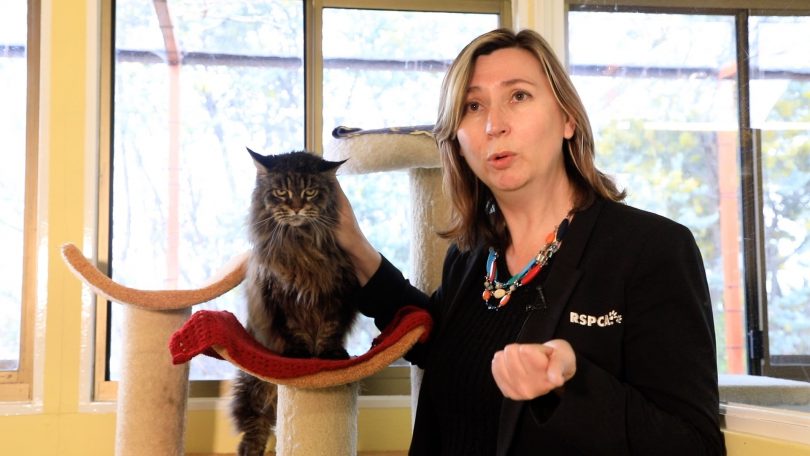
CEO of RSPCA ACT Michelle Robertson with one of the many cats in their care. Photo: Michelle Kroll.
Vanessa says it has been an incredibly busy year, but the self-funded Street Cat Alliance has received lots of donations to keep it going. They also have an important message for cat owners in Canberra.
“Please desex your cat,” Vanessa says. “We will often find a colony of female cats so if we aren’t able to care for them and desex them, they would soon populate and the problem would only grow.
“Don’t abandon your cat or go for that free cat off Gumtree. Look at cat containment measures if they go outdoors. It’s a big issue here in Canberra but we know we can learn to live with these street cats and build trust with them.”
*Edited to clarify that the Street Cat Alliance runs adoption and re-homing programs in addition to their community care program.












